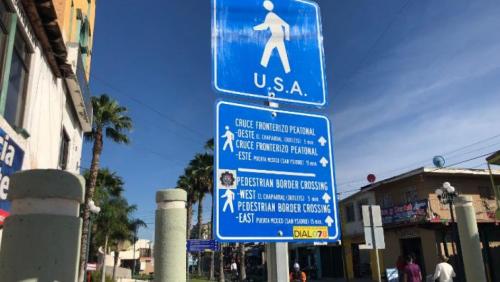US: New Rule Flouts Asylum Norms
Administration Establishes New Ground to Bar Asylum Seekers
The Trump administration on July 15, 2019 announced a new rule that effectively bars from asylum nearly anyone who crosses the southern US border after traveling through a third country, Human Rights Watch said on July 15, 2019.

In Tijuana, migrants can no longer simply show up at the border to claim asylum in the US. They must first put their names on a list and wait in Mexico - for weeks on end.
“The Trump administration’s new rule shows breathtaking disregard for US obligations toward asylum seekers,” said Bill Frelick, refugee rights director at Human Rights Watch. “It dumps asylum seekers on other countries without any assurances that they will get a fair hearing.”
The “Third-Country Asylum Rule” establishes a new ground for ineligibility for asylum that essentially drops the word “safe” from the “safe third country” provision that already exists in US law. The existing provision, in conformity with international law and practice, allows US immigration authorities to return an asylum seeker to a third country that has a formal readmission agreement with the United States and where the asylum seeker would not be persecuted and would have access to a full and fair asylum procedure.
The United States and Canada have a safe-third-country agreement. The agreement is based on both countries having comparable asylum standards and procedures and formal guarantees that an asylum seeker transferred from one country to the other will have a fair hearing of their refugee claim.
The Trump administration’s rule ends these safeguards, Human Rights Watch said. It establishes through executive action a bar to asylum whereby anyone crossing the southern land border who transits through nearly any third country in the world will be sent back to that country. Asylum seekers are sent to this third country without any guarantees for a full and fair hearing on their asylum claims. The rule contains exceptions for asylum seekers who traveled through countries that are not parties to either the United Nations Convention against Torture or the 1951 Refugee Convention or its 1967 Protocol (only 17 countries are party to none: Barbados, Bhutan, Brunei, Cook Islands, Grenada, India, Kiribati, Malaysia, Myanmar, Niue, North Korea, Oman, Palau, Saint Kitts and Nevis, Saint Lucia, and Tonga. The rule, which is effective as of July 16, also makes exceptions for victims of “a severe form of trafficking in persons” and for people who had applied for but were denied asylum in a third country.
“The United States can efficiently and fairly conduct asylum hearings and should not be sticking this responsibility onto countries with far less capacity,” Frelick said. “This policy appears to be motivated by the administration’s disparaging view of asylum seekers rather than a genuine need.”
Source:Human Rights Watch
- 301 reads
Human Rights
Ringing FOWPAL’s Peace Bell for the World:Nobel Peace Prize Laureates’ Visions and Actions

Protecting the World’s Cultural Diversity for a Sustainable Future

The Peace Bell Resonates at the 27th Eurasian Economic Summit

Declaration of World Day of the Power of Hope Endorsed by People in 158 Nations

Puppet Show I International Friendship Day 2020

